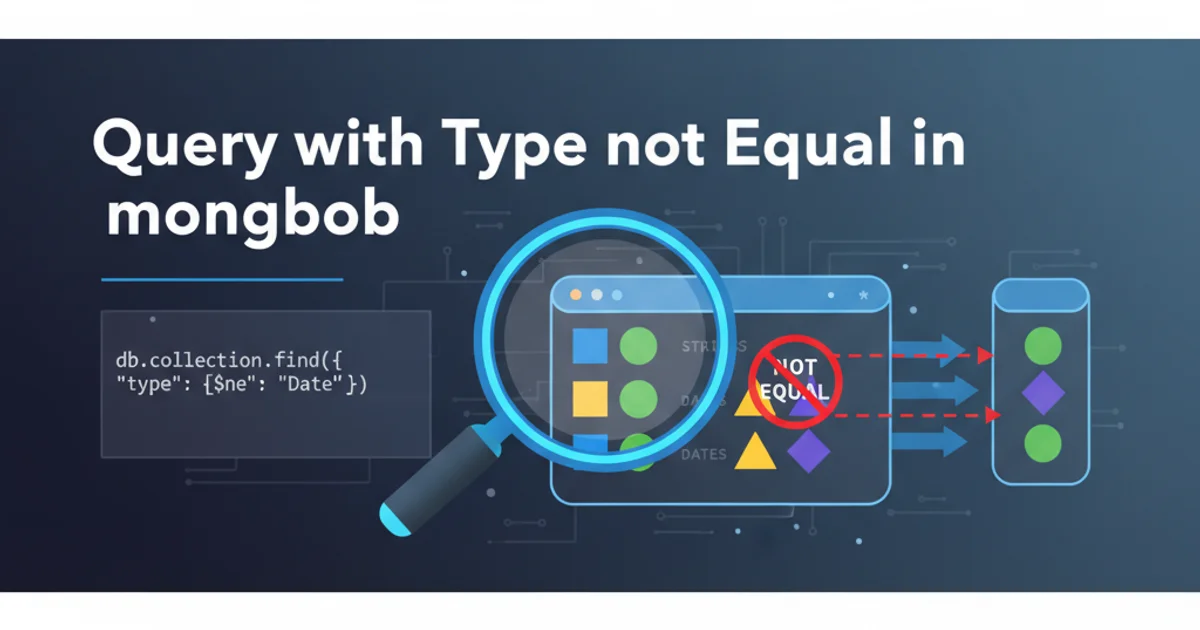Query with Type not Equal in mongodb
Mastering MongoDB: Querying Documents with Type Not Equal

Learn how to effectively query MongoDB documents where a field's type is not equal to a specified BSON type, enhancing data retrieval precision.
MongoDB's flexible schema allows documents within a collection to have varying structures and data types for the same field. While this flexibility is powerful, it can sometimes complicate queries when you need to target or exclude documents based on a field's BSON type. This article explores how to use the $type operator in conjunction with the $ne (not equal) operator to precisely filter documents where a field's type does not match a specified BSON type. This technique is invaluable for data cleaning, validation, and advanced querying scenarios.
Understanding BSON Types in MongoDB
Before diving into queries, it's crucial to understand BSON types. MongoDB stores data in BSON (Binary JSON) format, which extends JSON with additional types like Date, ObjectID, BinData, and more. Each BSON type has a corresponding numeric code and an alias. When querying by type, you can use either the numeric code or the string alias. Knowing these types is fundamental to constructing accurate type-based queries.
flowchart TD
A[Start Query] --> B{Field Exists?}
B -->|No| C[Exclude Document]
B -->|Yes| D{Check Field Type}
D -->|Type Matches Target| E[Exclude Document]
D -->|Type Does Not Match Target| F[Include Document]
F --> G[End Query]
C --> GDecision flow for querying documents with type not equal
Basic Syntax for $type with $ne
To query for documents where a field's type is not equal to a specific BSON type, you combine the $type operator with the $ne (not equal) operator. The basic syntax looks like this:
db.collection.find({ <field>: { $not: { $type: <BSON type> } } })
Alternatively, you can use the $ne operator directly:
db.collection.find({ <field>: { $type: { $ne: <BSON type> } } })
Both approaches achieve the same result. The <BSON type> can be either the numeric code or the string alias for the BSON type you want to exclude.
// Example: Find documents where 'age' field is NOT a number
db.users.find({ age: { $not: { $type: "number" } } });
// Using numeric code (16 for 32-bit integer, 1 for double, etc. - 'number' covers both)
db.users.find({ age: { $not: { $type: 16 } } });
// Example: Find documents where 'name' field is NOT a string
db.products.find({ name: { $type: { $ne: "string" } } });
Examples of querying with $type and $ne
Handling Missing Fields vs. Non-Matching Types
An important consideration when using $type is how it interacts with missing fields. If a field does not exist in a document, $type will not match any specific type. When you use $not: { $type: <BSON type> }, it will include documents where the field is missing, as a missing field does not have the specified type. If you specifically want to exclude documents where the field is missing, you'll need to add an additional condition using $exists.
// Sample data for demonstration
db.data.insertMany([
{ _id: 1, value: "hello" },
{ _id: 2, value: 123 },
{ _id: 3, value: true },
{ _id: 4, value: null },
{ _id: 5, anotherField: "test" } // 'value' field is missing
]);
// Query 1: Find documents where 'value' is NOT a string (includes missing 'value')
db.data.find({ value: { $not: { $type: "string" } } });
// Expected: { _id: 2, value: 123 }, { _id: 3, value: true }, { _id: 4, value: null }, { _id: 5, anotherField: "test" }
// Query 2: Find documents where 'value' EXISTS AND is NOT a string
db.data.find({ value: { $exists: true, $not: { $type: "string" } } });
// Expected: { _id: 2, value: 123 }, { _id: 3, value: true }, { _id: 4, value: null }
Distinguishing between missing fields and non-matching types
null value. null is a valid BSON type (type code 10), so {$type: 'null'} will match documents where the field is explicitly set to null.Practical Use Cases
Querying with type not equal is useful in several scenarios:
- Data Cleaning and Validation: Identify documents where a field unexpectedly holds a different data type than intended, allowing you to correct inconsistencies.
- Schema Enforcement (Soft): While MongoDB is schemaless, you can use these queries to find documents that deviate from an expected schema pattern.
- Migration Preparation: Before migrating data or applying schema changes, identify documents that might cause issues due to unexpected types.
- Debugging: Pinpoint documents that are causing application errors because a field's type doesn't match what the application expects.